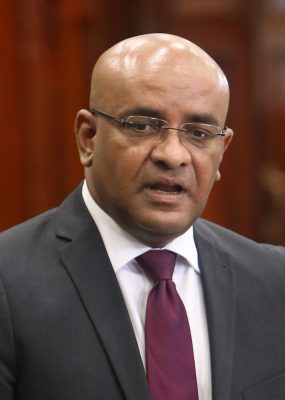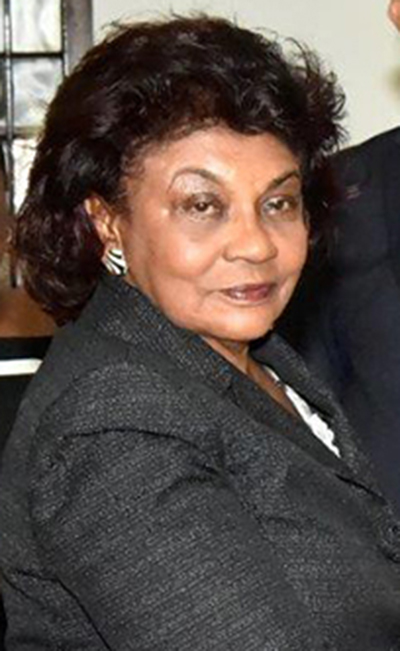Opposition Leader Bharrat Jagdeo says that the decision by the Guyana Elections Commission (GECOM) to remove from the Official List of Electors (OLE), persons who have not collected their identification (ID) cards as far back as 2008, is “patently illegal” and called upon GECOM Chairperson Justice Claudette Singh to explain.
According to Jagdeo, the decision is aimed at either using GECOM to disenfranchise Guyanese, in breach of at least two court decisions on the subject, or setting the foundation for an elections petition in the event that the result of next year’s March 2nd elections is not in government’s favour. Asked whether the opposition will take legal action in light of its claim of illegality, Jagdeo said a decision will be made after Justice Singh has explained the rationale for her decision.
These views were shared with the media during a press conference yesterday at the Office of the Opposition Leader on Church Street.

During the press conference, Jagdeo pointed to a report in the Guyana Chronicle detailing statements by government-nominated commissioner Vincent Alexander who said that the aim of the move is not to require the use of an ID card, but that the persons, since 2008, have not presented themselves to show that they exist, are alive, and are resident in Guyana. Alexander reportedly said that writing the persons gives GECOM the opportunity to make a determination as to these things.
The opposition leader argued that by pursuing this route, A Partnership for National Unity (APNU) is utilising GECOM to execute objections during the claims and objections period, as opposed to doing the work itself.
“If APNU desires to make objections to names on the OLE, it may do so during the claims and objections period which is ongoing. That would be the legal route to take,” Jagdeo said. He added that to date, the party has made less than 100 objections.
“But Vincent Alexander wants to remove them through a back-door, illegal process, rather than going through the statutory process of filing objections to names on the list. If you file an objection, that means GECOM is required to follow a process, and the process can result in the person being removed from the voters’ list. But, you cannot file an objection on the basis that you cannot find the person, or the person is not resident in Guyana because the Chief Justice has already ruled on that issue,” Jagdeo said.
ID Cards are not required to vote
Despite Alexander’s contention that the issue is not the ID card, Jagdeo argued that any decision taken will be tied to whether a citizen who is qualified to vote, uplifted his ID card. He emphasised that the cards under focus are national ID cards, not voters ID cards, and are therefore not required to facilitate voting. He recalled that in the past, national ID cards were issued by the Ministry of Home Affairs, but then the responsibility moved to GECOM as the elections body was already responsible for generating the National Register of Registrants (NRR) and the OLE. “It (the national ID card) has no direct relationship to your presence on the voters’ list or voting,” the opposition leader said.
Jagdeo also pointed out that Article 159 of the Constitution establishes the age of majority (18 years), and citizenship to Guyana or a Commonwealth Country while domiciled and resident in Guyana, as the only requirements to vote.
Even if the cards in GECOM’s possession were voter ID cards, this would make no difference as Jagdeo recalled that it was Justice Singh, in the 1998 Esther Pereira elections petition case, who decided that the requirement for voters to have a voter ID card in 1997, despite a parliamentary agreement to use the cards, contravened Articles 59 and 159 of the Constitution and was therefore of no effect. This decision led to the nullification of the 1997 general and regional elections results, and the triggering of fresh elections. In light of this decision in particular, Jagdeo said, GECOM’s decision, which was delivered by Justice Singh, is inexplicable.
Further, he cited the recent decision by Chief Justice Roxane George, who, in a case challenging the constitutionality of the recent house-to-house registration, said that the removal of persons from the NRR on the basis of non-residency is unlawful, as names are only to be removed in a manner sanctioned by the National Registration Act, which includes death and insanity among the grounds for removal.
According to Jagdeo, government is “…attempting to either disenfranchise…large swathes of people, hoping it would change the electoral arithmetic, or creating, and I think the second is more likely, creating the legal basis for a legal challenge after the elections, knowing that…an area that has already seen an election overturned in the past has been the area of the use of a national identification for voting.”
Jagdeo also pointed out that former GECOM Chairman, Steve Surujbally, while commenting on the fact that more than 43,000 ID cards were not uplifted, “stressed that the cards were not voting cards, and that the requirement to vote was to be registered, not possession of an ID card.”
Yesterday, Stabroek News reported that GECOM has taken a decision to exclude persons from the 2020 OLE, if they do not uplift their national identification cards, some of which have been sitting uncollected at GECOM since 2008.
Opposition-nominated commissioner, Sase Gunraj, told reporters following a meeting that persons’ “…names will be published in the newspapers and they will be given 21 days within which to collect it, and if they fail to respond to that then they will be prevented from voting.” Government-nominated commissioner Charles Corbin went on to clarify that while these persons will be removed from the OLE, their names will remain on the NRR, meaning that “…if these persons exist, they may miss this round of elections because their names will not be extracted for the OLE but they will not be cancelled from the NRR.”






